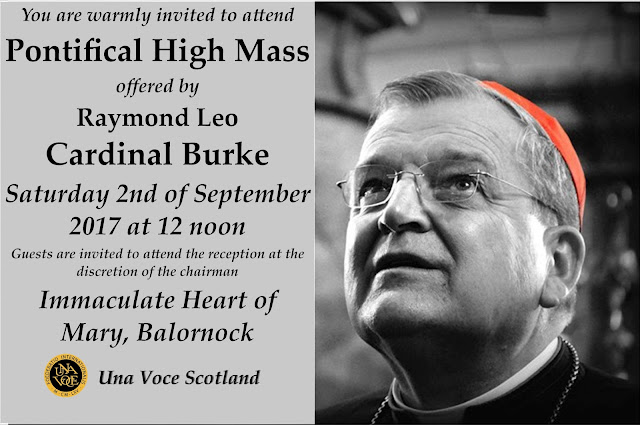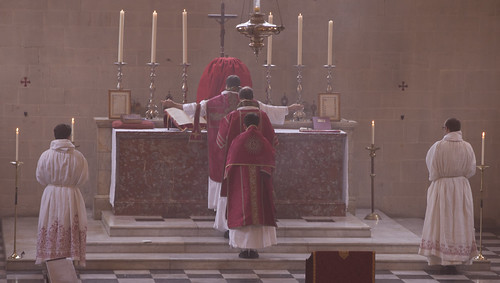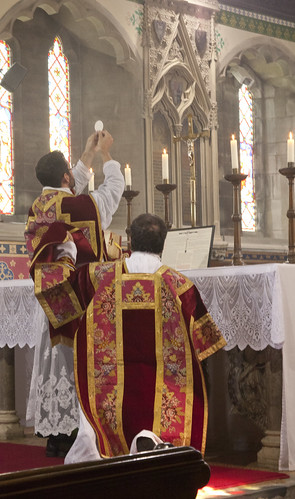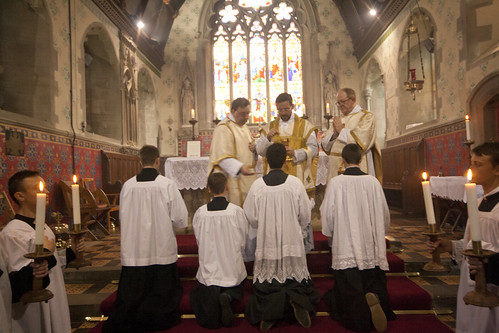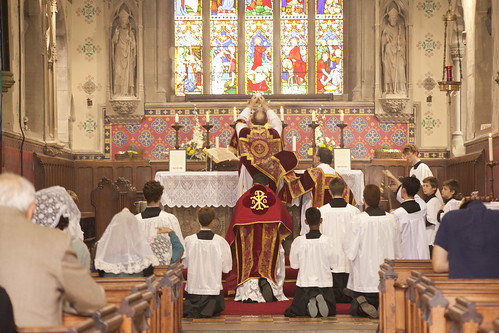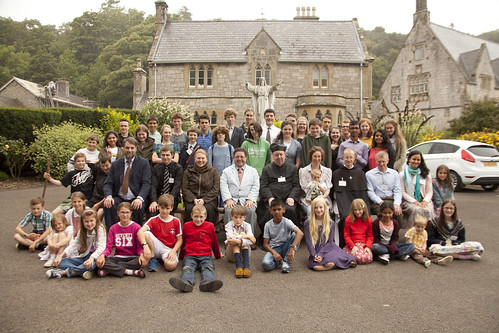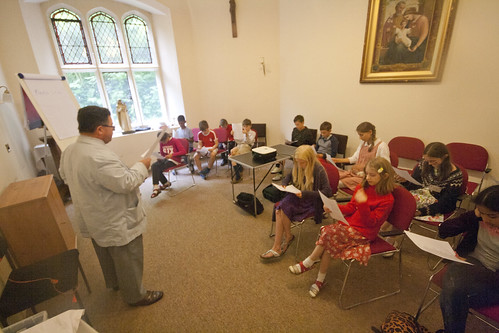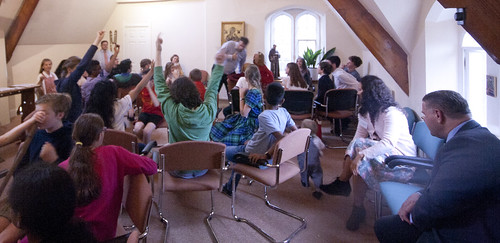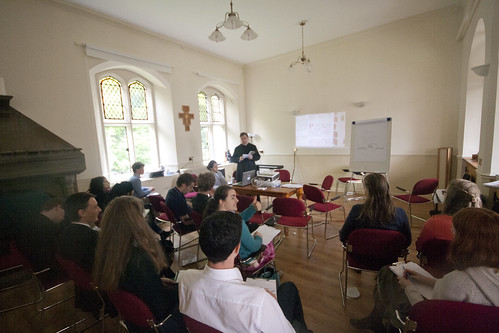Chairman's Blog
Guild of St Clare: sewing workshops in Oxford
Well, strictly speaking these are in Headington, a suburb of Oxford. But everyone is welcome. Cross-posted from the Guild blog.
Forthcoming autumn events
2nd September: Project Finishing - bring along your unfinished sewing projects and make some progress with the help of our skilled Guild members!
21st October: Embroidery techniques with Jacqui McDonald of the Royal School of Needlework
11th November: Vestment mending and making - we have various altar furnishings, chasubles, and a cope in need of repair. Join us to assist us in mending them, learn about their construction and serve the Church.
All these workshops are taking place at St Anthony of Padua church hall, 115 Headley Way, Oxford OX3 7SS. They run between 10am and 4pm. Tea and cake is provided - please bring your own lunch. For more details or to book a place please email Lucy on lucyashaw@gmail.com.
Support the work of the LMS by becoming an 'Anniversary Supporter'.
Autumn Mass of Ages published
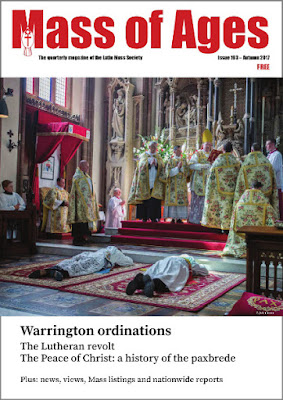 Mass of Ages is the quarterly magazine of the Latin Mass Society. It contains reports on our many activities across the country, national and international news of Traditional Catholic events, feature articles on different aspects of traditional Faith and culture, and opinions and views on developments in the Catholic Church.
Mass of Ages is the quarterly magazine of the Latin Mass Society. It contains reports on our many activities across the country, national and international news of Traditional Catholic events, feature articles on different aspects of traditional Faith and culture, and opinions and views on developments in the Catholic Church.The autumn 2017 edition is now available. The cover article, History in the Making, is a report on the first Ordinations in the Traditional Rite in England for more than 50 years. Other features are Angels and devils, by Canon Amaury Montjean of the Institute of Christ the King Sovereign Priest on the writings of St Francis de Sales, Thirty years of the Old Rite, a history of the Traditional Mass on the Isle of Wight and The Peace of Christ, in which the LMS Chairman, Dr Joseph Shaw, looks at the history of the paxbrede.
• Alberto Carosa talks to Coetus Internationalis Summorum Pontificum Secretary, Guillaume Ferluc, about the forthcoming Summorum Pontificum Pilgrimage to Rome.
• Caroline Shaw looks at El Greco’s The Burial of the Count of Orgaz
• Mary O’Regan on the Third Secret of Fatima
• Paul Waddington, a Vice-President of the LMS, reports on the recent restoration of the wall paintings in the sanctuary and Lady Chapel of Sacred Heart, Caterham.
• Fr Bede Row asks, “Do we still believe in Angels?”
• The Lone Veiler on Holy Communion
Support the work of the LMS by becoming an 'Anniversary Supporter'.
Music and silence: how I hate them both!
fe
Reposted from February 2016
----------------------------------------------
So exclaimed Screwtape, the devil imagined by C.S. Lewis in his Screwtape Letters. Music and silence have a lot in common, and it is something which enrages the devil.
Matthew Schellhorn, pianist and the LMS Director of Music for London, is this week exploring the relationship between the two on the Catholic Herald website. Here's a taster.
January 2016 saw an appeal from Cardinal Sarah for a “high-quality liturgical renewal” involving silence as a fundamental component. We need to respect silence in the sacred liturgy as “a Christian ascetical value”, a “necessary condition for deep, contemplative prayer”. Sarah asks: “If our ‘interior cell phone’ is always busy because we are ‘having a conversation’ with other creatures, how can the Creator reach us, how can he ‘call us’?”
...
Should you require it, you can even buy a mobile app that allows you to listen to exactly four and a half minutes of silence on the go. (You really cannot make it up.) That is 2016 for you, but what is really revealing, however, is that Cage felt that his piece would be “incomprehensible in the Western context” when he “wrote” it in 1952. Because, funnily enough, four and a half minutes or so is about the time of absolute silence we experience during the Canon of the Mass in the Usus Antiquior, the traditional Latin Mass. In other words, this length of silence proposed by Cage to classical music audiences in the mid-twentieth century was of a length commonly experienced daily by millions in the Western world at that time.
But, sadly, it may be that silence in the Mass was not understood well enough for us to register its sheer normality and naturalness. TheCatholic Encyclopedia of 1908 gives us the “mystic reasons” for the profound four-and-a-half-minute silence in the traditional Mass. The silent prayers are “thus shown to be purely sacerdotal, belonging only to the priest, the silence increases our reverence at the most sacred moment of the Mass, removes the Consecration from ordinary vulgar use, and is a symbol of our Lord’s silent prayer in the Garden and silence during his Passion”. Moreover, “the Ordinary to the Sanctus, with its lessons, represents Christ’s public life and teaching; the Canon is a type of the Passion and death – hence it is said in silence. Christ taught plainly, but did not open his mouth when he was accused and suffered.”
Cardinal Burke to celebrate traditional Pontifical Mass in Glasgow, 2nd Sept
Support the work of the LMS by becoming an 'Anniversary Supporter'.
Ivereigh on converts and cradle Catholics
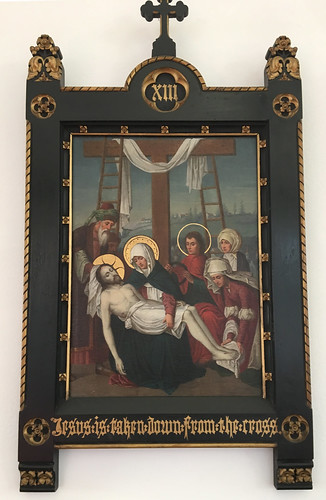 |
| Our Lord surrounded by converts. |
Austen Ivereigh has done it again: driven his opponents (many of whom he helpfully names) into a defensive frenzy, one which almost seems to prove the point he is making - namely, that these individuals get worked up too easily.
I want to say something about Ivereigh's modus operandi, before saying something about the substantive issue, which is to do with the fact that Ivereigh has noted that a number of people who worry about aspects of Pope Francis' papacy are converts, not cradle Catholics.
I must be frank: I think Ivereigh is a kind of genius. Watching him debate Matthew Schmittz of First Things on Al-Jezeera is like watching a gad-fly in cambat with a sumo-wrestler. He has done the same thing in this recent post on Crux about converts. I am interested in the form as well as the content of arguments, and I recognise a master at work. How does he do it?
There is, in fact, a formula.
1. Whenever your opponent raises an objection to something you have said, don't let yourself be pinned down: just change the subject.
You have some detailed and nuanced concerns about the interpretation of Amoris laetitiae? Let's talk about converts and cradle Catholics!
This is effective in extended public debate, private conversation and televised discussion alike. Some years ago I fell into conversation with the distinguished Church historian, Prof Henry Mayr-Harting - a pretty liberal Catholic - on a crowded train from London to Oxford. He was in pugnatious mood and we argued pleasantly the whole way. But he never replied to my objections to anything he said except in such a way that I was provoked into addressing a substantially new claim that he was making. By the end of the journey I felt as if I'd spent an hour wrestling with a ghost. Since then I've seen this strategy in action from Mgr Basil Loftus as well as Austen Ivereigh.
This works by appealing, in one's defence, to principles or facts with which one's opponent strongly disagrees, and that brings us to the next part of the formula.
2. Tempt your opponent into arguing on the issues you want him to by asserting airily what you know he will disagree with.
There are issues, and sub-issues, and specific examples, about which one side of any debate looks or weaker. Why waste your time arguing over the ones where you look relatively weak, when you can force your opponent to spend all his time focused on the ones on which you look relatively strong? How can you do this? By provoking him to follow you into these sub-issues, and throwing in your favoured examples even if they are irrelevant to the matter in hand. It works best with an opponent who keeps thinking: 'I can't let that claim go unchallenged, particularly on TV! People might think I agree with it.'
Now, if you actually want to persuade your interlocutor of a specific point, you need to avoid appealing to things you know he rejects, so it might appear that this strategy is self-defeating. But that would be to assume that the purpose of debate is to persuade the opponent or anyone in the audience who was inclined to agree with him, and that would be a mistake. Rather, the final part of the formula is this:
3. Provoke outrage in your opponent by outrageous and insulting assertions.
The purpose of the debate, for people like Loftus and Ivereigh, is not to persuade, but to lessen their opponent's effectiveness. One way of doing this is by moving the debate to places where he looks less good, as noted above. Another is by inducing some degree of spluttering rage. The hoped for result is to infuriate and humiliate him, and in this way to silence him and his supporters. This works particularly well where the audience is not well-informed on the subject at issue, and best of all when the audience is a liberal or a secular one. Anyone, indeed, who is not following the argument is some detail - and Ivereigh is careful to make the path of argumentation dizzyingly serpentine by constantly changing the subject - is reduced to scoring the debate on the basis of which of the debaters is looking calm and self-satisfied and which is looking defensive and hot under the collar. The result is that Ivereigh comes out looking like the victor even if his opponent has given a series of his claims crushing ripostes. Ivereigh gives no sign of being crushed, and everyone watching is too confused to know what's going on.
In a stand-alone article or blog post the above formula is adapted: the trick here is to make so many outrageous or insulting claims that opponents start spluttering from the start, and onlookers think: here is the masterful Ivereigh, cool and collected, and there are a bunch of people shouting and getting red in the face.
I realised, in addressing the appalling weekly columns of Mgr Loftus, that it would take a small book to go into all the asinine claims of just one week's output. Admittedly, after a while you notice that he is repeating himself a good deal. But all the same, a thorough response would be a full-time job. And that's two birds with one stone, isn't it? A pile of theological nonsense purveyed to the public, and a potentially effective opponent tied up in knots looking to most people like a nit-picking member of the Spanish Inquisition.
Ivereigh is an incomparably more sophisticated media operator than Loftus, but what's is particularly striking about his latest column is how appallingly rude it is. He doesn't just casually refer to his opponents as neurotics: he goes to some lengths to suggest he is using the word in a technical, medical, sense. He is really, truly, saying that half a dozen named Catholic journalists and commentators are mentally ill, for the simple reason that they disagree with him. Outrage is absolutely appropriate, but I fancy it will get us all nowhere.
It is important to notice that if a conservative Catholic tried this schtick, it wouldn't work. One important reason is that a conservative who baited his opponents with outrageous claims and insults would not be tolerated by his fellow conservatives. (This happens from time to time.) Liberals, on the other hand, are happy to let each other get away with this sort of thing, not because they all agree with all the detailed claims - far from it - but because they are happy to see them being used in the great war against orthodoxy which they all support. Does John Allen, for example, agree with Ivereigh's absurd claim that the Pope is 'chosen by the Holy Spirit'? I doubt it. But for the duration of Pope Francis' papacy, he's happy to publish Ivereigh's liberal ultramontanist ravings because they are tactically effective. (I've written more about this here.)
I suppose it's worth stating the obvious, that the approach I've described deepens divisions and embitters opponents, and that it is contrary to charity and intellectually dishonest. But hey, all's fair in love and war, isn't it?
So, what of Ivereigh's substantive point about converts? Well, it is very simple. Converts in general view the Church in terms of theology and ideas, because they have come into the Church, usually, because of theology and ideas. Cradle Catholics can fall prey to the temptation to see their Catholic identity as a tribal thing. If the Church were somehow to change her teachings, tribal Catholics would, obviously, be less troubled than intellectual converts. There are in fact plenty of cradle Catholics who understand that the Church is not some quasi-ethnic or cultural group, or a cosy club, but actually a community defined by adhesion to the message of the Gospel and the Church's authority and sacraments. We are blessed, however, with a particularly high proportion of converts who recognise this reality without any prompting.
So, God bless you, Matthew Schmitz, Rusty Reny, Edward Pentin, Carl Orlson, John Henry Westen and Daniel Hitchens! All personally demonised by Austen Ivereigh, but gifts indeed from the Holy Spirit to the Church: the Holy Spirit which in every age refreshes the Church with converts. Heaven knows, we cradle Catholics have done little indeed to deserve your assistance.
Support the work of the LMS by becoming an 'Anniversary Supporter'.
Come to Walsingham with the Latin Mass Society!
 |
| LMS Pilgrims outside the Slipper Chapel at the Catholic Shrine to Our Lady of Walsingham |
Support the work of the LMS by becoming an 'Anniversary Supporter'.
Family Day with the Friars in Gosport 12 Aug
I'll be giving a talk during a Family Day organised by the Friars in St Mary's, Gosport, on Saturday 12th August.
St. Mary’s Church, 32 High Street, Gosport, Hampshire, PO12 1DFTel: 023 9258 0119(* During the talks for the Adults there will be talks and activities for the Children and an opportunity to receive the Chord of St. Philomena)9:30 am - Holy Rosary10:00 am - Solemn High Mass (in the Extraordinary Form) for the Feast of St. Clare of Assisi.12:10 pm – Opening welcome12: 15 - First Talk – ‘The Crisis of the Father’ by Dr. Joseph Shaw Chairman of the Latin Mass Society (Including a Question and Answer session).1:00 pm – 2:00pm - Lunch (please bring some food to share if you can).2:15 pm – 3:00 pm - Second Talk – ‘Fatima and Marriage’ by Fr. George Mary Roth (talk will be given in the Church).3:00 pm – Holy Rosary (in the Church).3: 30pm – 4: 00 pm – Tea Break and Social gathering.4: 00 pm – 4:45 pm – Third Talk – ‘Why we home school and how it works’(Including a Question and Answer session).4:45 pm – 5: 00 pm – Short break.5: 00 pm – 5: 45 pm – Fourth and Final Talk – ‘Presentation on Modesty for women and girls’ by Mrs. Elizabeth Dulston (Including a Question and answer session).5:45 – 6:15 pm – Further discussion and talk with our speakers.6:30 pm – Conclusion with Exposition of the Blessed Sacrament and Solemn Vespers.Please check for local parking.
Support the work of the LMS by becoming an 'Anniversary Supporter'.
A modest proposal about the public treatment of mothers
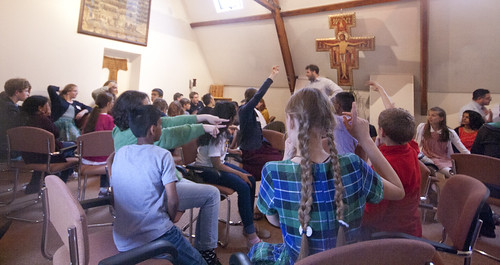 |
| Quiz at the SCT Summer School |
During a discussion of large families and (inevitably) of Natural Family Planning, on Facebook, one of my FB friends remarked:
We suffer both extremes, those who feel the need to take it upon themselves to make such invasive and snarky comments, that think NFP is there to make sure you only have a respectable number of kids, or, as I call them, NFP crusaders; and on the other hand certain trads that think all NFP is evil and even if you are dying you have to keep popping out kids (even though permission for NFP goes back to Bl. Pius IX).
I don't think this is simply a Catholic problem arising out of the debate about Catholic teaching. It is, rather, a Catholic version of a wider phenomenon. Another commentator had started off the discussion by pointing out, of parents, and particularly of mothers, with more than two children:
Everywhere they go they are mocked, scorned and insulted. They are accustomed the most unpleasant and intrusive commentary on the most intimate part of their life: being asked whether they haven't yet found out where babies come from, or why they don't get a television to assist them limit their family size, is a regular and frequent occurrence. They are attacked on public transport, in shops, in their own homes by visiting engineers and delivery men...
It reminds me of stories about young men being accosted in the street during the First World War about why they had not volunteered for the army, or presented with the white feathers of cowardice. The imperative of the war had made it everyone's business, and people made accusations first and enquiries later: the enquiries themsevles being a violation of privacy, as if people had a duty to parade their health problems. The war made possible an orgy of self-righteousness, which seems to be the most pleasurable of all the emotions.
Support the work of the LMS by becoming an 'Anniversary Supporter'.
Letter in The Tablet: Liturgical pluralism
I was pleased to see John Baldovin SJ (Towards the summit, 22nd July) distinguishing the question of the 'Reform of the Reform' of the Ordinary Form from the question of the Extraordinary Form. The conflict over the first is fought out in parishes up and down the land. By contrast, there need be no conflict between the two forms. The celebration of one need not impinge on those who attend the other, if each is given proper space.
Fr Baldovin complains, however, that it is anomolous to have two 'forms' or rites in the Latin Church. He appears to have forgotten that the Roman Rite has long embraced Dominican, Norbertine, Carthusian, and other usages, the remnants of a still greater variety from the days of the Sarum and Gallican Missals. The anomoly, surely, is in the post-conciliar liturgical homogenisation, which flies in the face of the Council's instructions: Sacrosanctum Concilium 37 rejected 'rigid uniformity' (cf. Unitatis redintegratio 17).
What puzzles me most however is Fr Baldovin's quest for ulterior motives in those attracted to the ancient Mass, such as a stronger Catholic identity, or a rejection of the Council. He himself writes that it can be 'wonderful, a thing of beauty', 'a kind of reverent transcendence that is often lacking' in the OF. Isn't this explanation enough? And should we not be encouraging the celebration of such a liturgy?
Yours faithfully,
Joseph Shaw, Chairman, The Latin Mass Society
Support the work of the LMS by becoming an 'Anniversary Supporter'.
St Catherine's Trust Summer School: some photos
 |
| The end of school quiz. |
The St Catherine's Trust Summer School took place last week: it runs from Sunday to Sunday. Numbers have gone up every year for several years, and we welcomed 39 children this year. There was a full minibus load from London, and nine travelled by train from Scotland.
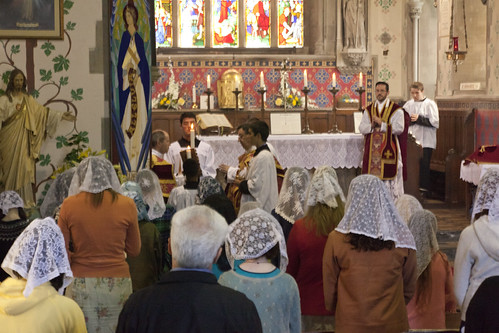 |
| High Mass, with Fr Richard Bailey celebrating and Fr Aidan Keiran as subdeacon: these priests were involved with the Latin Course which runs alongside the Summer School. |
The Summer School exposes children to a week of traditional liturgy, which they would only otherwise experience by visiting a monastery. We have sung - usually High - Mass every day, sung Compline each evening, Benediction twice in the week; each day begins with the Rosary. We always have Stations of the Cross on Friday.
We have a couple of visiting speakers: this year is was Canon Scott Tanner ICKSP from New Brighton, and Fr Mark Higgins from Ramsgate. They gave us Benediction after their talks.
There are, of course, lessons. This isn't a Summer Camp: we do have games and activities and outings, but a lot of the week is spend in classrooms, divided up into three groups. Our Chaplain, Fr Andrew Southwell, teaches Catechism every day; we also have drama, history, philosophy, history of art and whatever the teachers feel inspired to talk about. Naturally, we also give an introduction to Latin, and even Greek, and teach Gregorian Chant. This year we had a couple of polyphonic motets at the final Mass which were prepared during the week.
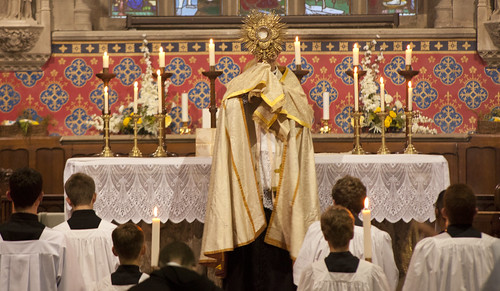 |
| Canon Scott Tanner ICKSP gives Benediction |
The venue is the attractive Franciscan friary and retreat centre of Pantasaph, which includes the Pugin church of St David's, in the lovely Welsh countryside. It is a short distance from the Catholic shrine of St Winefride's Well at Holywell.
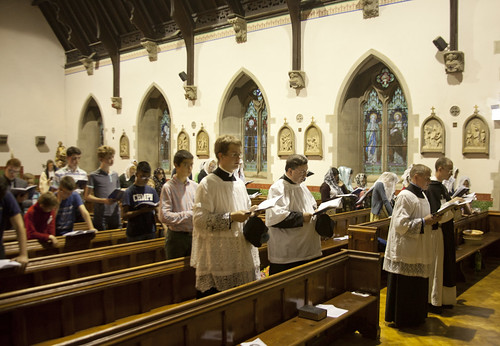 |
| Compline |
This year we visited St Mary's, Warrington, which now belongs to the Fraternity of St Peter and celebrated Mass there; and we visited Chester, the site of two early Christian martyrdoms, and one of England's most picturesque cities.
The first of our Summer Schools took place in 2005, and we have the same core team. We have been in three different venues, but we've been at Pantasaph for a few years now and I hope we'll remain there. It has been interesting to see whole families of siblings pass through the school, to watch them grow up. It has been a privilege to teach them.
They keep coming back, so clearly we're doing something right! It is all made possible by the sponsorthship of the Latin Mass Society, and others: a big thank you to all our supporters, including the very generous parents. This support makes it possible for us not to charge a fee: a core principle of the school.
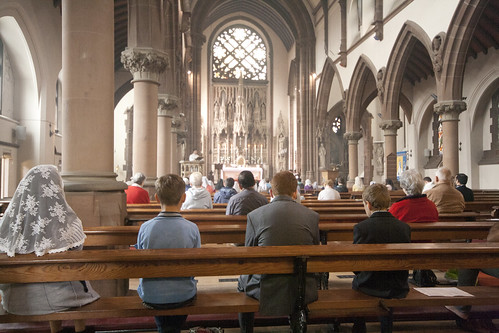 |
| St Mary's Warrington |
Support the work of the LMS by becoming an 'Anniversary Supporter'.

